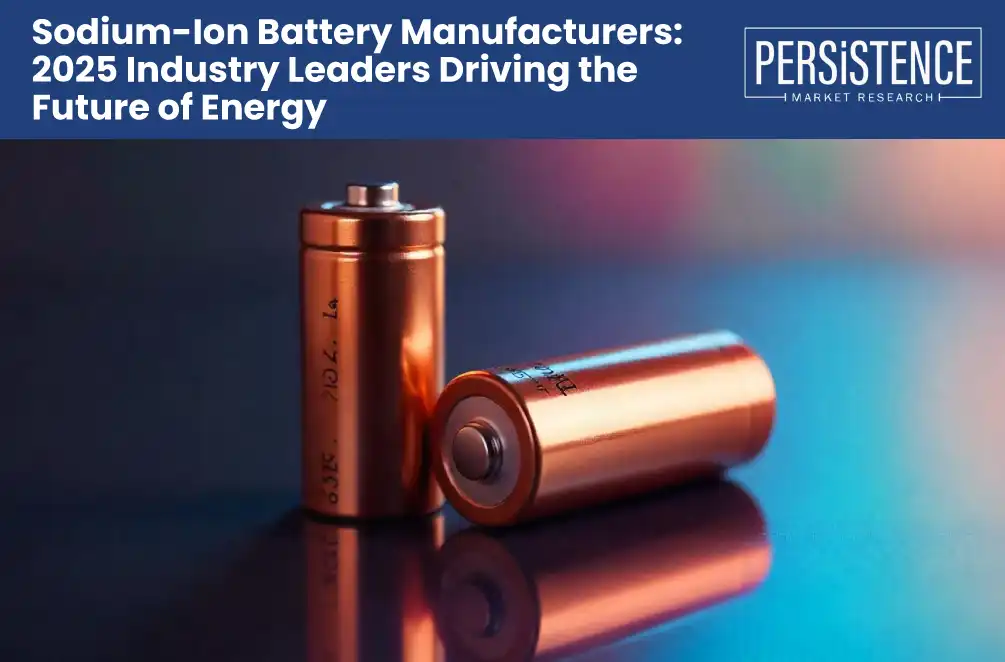- Blog
- Top Sodium Ion Battery Manufacturers
Sodium-Ion Battery Manufacturers: 2025 Industry Leaders Driving the Future of Energy
Published On : 16 Jul 2025
What are sodium-ion batteries, and why are they important in energy storage?
Sodium-ion batteries are rechargeable batteries that use sodium ions (Na+) instead of lithium ions to store and release energy. As the demand for sustainable and cost-effective energy solutions grows, sodium-ion technology is gaining traction due to its affordability, safety, and environmental benefits.
Unlike lithium, sodium is abundant and widely distributed, reducing geopolitical risks and supply chain bottlenecks. Sodium-ion batteries also offer excellent thermal stability, making them ideal for grid storage, electric vehicles (EVs), and industrial applications. With advancements in energy density and cycle life, sodium-ion batteries are emerging as a viable alternative to lithium-ion batteries.
Which company is leading the sodium-ion battery market in 2025?
CATL (Contemporary Amperex Technology Co., Ltd.), a global leader in lithium-ion batteries, is now pioneering sodium-ion battery development. CATL’s first-generation sodium-ion battery delivers an energy density of 160 Wh/kg and charges 80% in just 15 minutes.
CATL is integrating sodium-ion cells into electric vehicles and energy storage systems, aiming to reduce reliance on lithium and diversify its battery portfolio. Its large-scale manufacturing capabilities and R&D investments position CATL as a dominant force in the sodium-ion battery industry.
How is Faradion revolutionizing sodium-ion battery technology in the UK and India?
Faradion, a UK-based innovator, specializes in non-aqueous sodium-ion batteries for high-power applications. Known for their long cycle life and safety, Faradion’s batteries are ideal for electric vehicles and renewable energy storage.
After being acquired by Reliance Industries, Faradion gained access to significant resources and market reach in India. This strategic partnership is accelerating the deployment of sodium-ion batteries in emerging markets, where cost-effective and scalable energy solutions are critical.
What is HiNa Battery Technology’s role in sodium-ion EV development?
HiNa Battery Technology Co., Ltd., based in China, is making strides in sodium-ion battery innovation for electric vehicles. The company offers three types of sodium-ion cells with energy densities between 140 and 155 Wh/kg.
HiNa partnered with JAC Motors to integrate sodium-ion batteries into passenger vehicles, including a prototype with a 25 kWh battery pack. The company is also securing raw materials by acquiring a sodium carbonate mine in Mongolia, ensuring a stable supply chain for future production.
Why is Natron Energy’s sodium-ion technology ideal for industrial applications?
Natron Energy, a U.S.-based company, uses Prussian blue electrodes in its sodium-ion batteries, offering high power output, rapid charging, and long cycle life. These features make Natron’s batteries perfect for industrial use cases such as data centers, telecom infrastructure, and EV fast-charging stations.
Natron’s focus on safety and performance has earned it recognition in the North American market, where reliability and speed are essential for energy-intensive operations.
How is TIAMAT powering Europe’s mobility with sodium-ion batteries?
TIAMAT, a French startup, is developing ultra-fast charging sodium-ion batteries for mobility and stationary energy storage. Their batteries can charge in just five minutes and offer high safety standards, making them ideal for urban transportation.
In 2025, TIAMAT secured €30 million to build a 5 GWh production facility, supporting the EU’s push for energy independence and clean mobility. TIAMAT’s technology is particularly suited for electric buses, delivery fleets, and smart city infrastructure.
What innovations are driving Altris AB’s success?
Altris AB, based in Sweden, has developed a commercial sodium-ion cell with energy density comparable to lithium iron phosphate (LFP) batteries. Their patented Fennac electrolyte enables over 10,000 charge cycles, making it ideal for long-term energy storage.
Altris is collaborating with Clarios for automotive applications and Polarium for stationary storage, expanding its reach across Europe. The company’s focus on safety, sustainability, and performance makes it a key player in the sodium-ion battery ecosystem.
What is the future outlook for sodium-ion battery manufacturers?
As manufacturers improve energy density, cycle life, and scalability, sodium-ion batteries are expected to play a pivotal role in decarbonizing transportation and energy systems.
With increasing regulatory support, strategic partnerships, and technological breakthroughs, sodium-ion battery manufacturers are well-positioned to meet the world’s growing demand for clean, affordable, and reliable energy storage.
Industry Report

Request Report Sample
Your privacy is important to us; your data is secure
Contact Us
Latest Reports
-
Ginger Oil Market by Product Type (Conventional, Organic), Application (Food & Beverage, Pharmaceutical & Nutraceutical, Aromatherapy, Cosmetics & Personal Care), and Regional Analysis for 2026 – 2033
-
Internet of Things (IoT) Market by Component Type (Software, Services, Hardware), Connectivity (Cellular (4G/5G), LPWAN (LoRaWAN, NB-IoT), Wi-Fi, Bluetooth/BLE, Satellite, and Misc), Organization Size (Large Enterprises and Small & Medium Enterprises (SMEs)), Deployment Mode (Cloud-Based, On-Premises, and Hybrid ) End Use Industry (Manufacturing, Healthcare, Automotive & Transportation, Retail, Energy & Utilities, Smart Cities & Buildings, Agriculture, Consumer Electronics, and Misc.) and Regional Analysis for 2026 - 2033
-
Food Pathogen Testing Market by Pathogen Type (Salmonella, Listeria, E. coli), Technology (Rapid, Traditional), Food Type (Meat & Poultry, Processed Foods, Dairy), End-user (Food Manufacturers, Testing Labs, Government Bodies), and Regional Analysis 2026 – 2033
-
Managed Security Services Market Size, Share, and Growth Forecast 2026 – 2033 by Service Type (Managed Network & Perimeter Security Services, Managed Endpoint & Application Security Services, Managed Cloud Security Services, Managed Security Operations & Monitoring Services, Managed Advanced Threat Detection Services, Others), by Operation Mode, by Organization Size, by End Use, by Regional Analysis, 2026–2033
-
Fluorosurfactants Market by Product Type (Non-Ionic, Anionic, Cationic, Amphoteric), Application (Paints & Coatings, Adhesives & Sealants, Caulks, Waxes & Polishes, Polymers, Foamers, Inks, Others), End-User (Construction & Architecture, Automotive, Consumer Goods, Oilfields, Electronics, Others), and Regional Analysis for 2026-2033

